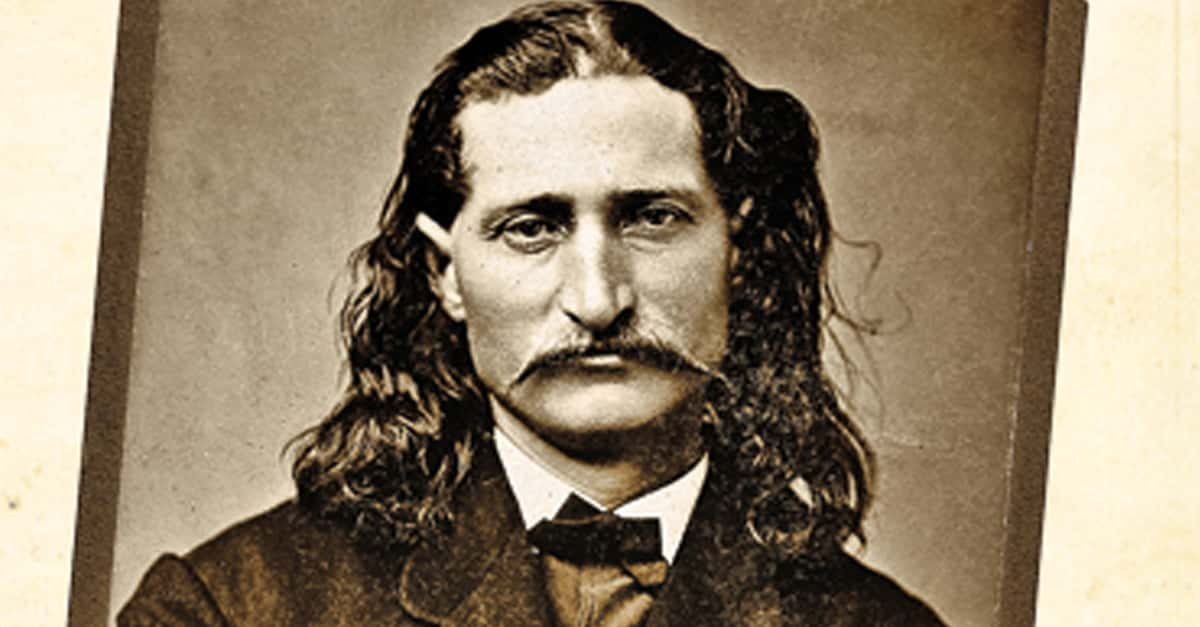How Did Bill Hickok Really Die


It's kind of a rule of thumb that if you commit a crime in front of witnesses and by some miracle beat the rap, you shouldn't start bragging about it. Especially not where a peace officer can hear you and do something about it. On the other hand, there's nothing in the history books that says Jack McCall was particularly bright.
The summer of 1876, Wild Bill Hickok was in Deadwood to make money. He already had fame and a reputation as one of the deadliest shootists on the frontier. (The man even fought a bear to the death. The bear's death, not his.) He'd been a peace officer, responsible for taming cow towns in Kansas, until accidentally shooting and killing one of his deputies. His eyesight was starting to fail — perhaps glaucoma, perhaps something more social — and he had recently married for the first time. He came to Deadwood, a boomtown mining camp, to prospect, perhaps gamble — put together some cash for married life. That was the plan, anyway.
Biography tells us that on August 1, Hickok was playing cards in Nuttall and Mann's No. 10 Saloon. With his reputation — others seeking revenge, or seeking their own reputation — he erred on the side of caution, sitting with his back to the wall in public. As Tom Clavin writes in Wild Bill: The True Story of the American Frontier's First Gunfighter, Hickok hadn't been on a winning streak, but another player, Jack McCall, was doing worse.
Martha Jane Cannary (May 1, 1852 – August 1, 1903), better known as Calamity Jane, was an American frontierswoman.In addition to many exploits she was known for being an acquaintance of Wild Bill Hickok.Late in her life, she appeared in Buffalo Bill's Wild West show and at the 1901 Pan-American Exposition.She is said to have exhibited compassion to others, especially to the sick and needy. For instance, Calamity was never an Army scout or the lover of Wild Bill Hickok, but she was a mother who loved her children and often did women’s work while dressed in women’s clothing. “Sadly,” he writes in his introduction, “after romantic adventures are removed, her story is mostly an account of uneventful daily life interrupted.
Deadwood had plenty of saloons, but no legal standing
McCall lost heavily — entirely — and at the close of the hand, Hickok, 'Feeling bad for McCall, who seemed stupid but harmless,' gave the loser enough money for breakfast and some advice: Don't gamble unless you can cover your losses. Did McCall take offense?
Hickok Wild Bill
Hickok returned to the same venue the next afternoon. His usual seat against the wall was taken, and in a choice that has reverberated through history, Hickok sat with his back to the room. Jack McCall, a nondescript man with a double chin and crossed eyes, entered quietly, slipped up behind Hickok and put the muzzle of a .45 revolver against the back of the retired lawman's head. 'Damn you, take that!' he is said to have shouted as he pulled the trigger. After a moment, Hickok fell sideways out of his chair, dead before he hit the floor. It turned out that the only good bullet in the gun was the one that killed Hickok.
McCall made a run for it. He jumped on a horse tied outside — it wasn't his — but the saddle had been loosened and he fell off. He took off on foot, and hid in a butcher shop, where he was discovered and jailed. (Calamity Jane would later claim she was the one who found him, but — no. Not even a little.)
Wild Bill Hickok Pictures Of His Death
Hickok was dead before he hit the floor
Deadwood had no legal standing. Technically it was on a Native American reservation and shouldn't have even been there. A 'miner's court' was brought into session — judge and attorneys were appointed, a jury selected. McCall admitted he did it, but said the shooting was an act of revenge for his brother, whom Hickok had killed in Abilene. It took two hours for the court to find McCall not guilty, says Murderpedia — revenge seems to have been an acceptable motive for shooting someone in the back. True story: McCall had no brother — but there was no way for the Deadwood jury to know that.
Death Of Wild Bill Hickok
McCall walked free, but not for long. He moved to Wyoming and bragged about how he'd killed Hickok in a gunfight. A U.S. Marshal overheard him and arrested him, says the Law Library. Deadwood had no legal standing, but Laramie, Wyoming, did. McCall was extradited to Yankton, South Dakota, where he was tried for murder. He pleaded 'not guilty' but the jury wasn't buying it. It took them three hours to reach a guilty verdict. His appeal was denied. On March 1, he was hanged by the neck until dead, the first man legally executed in South Dakota. He was buried with the noose still around his neck.